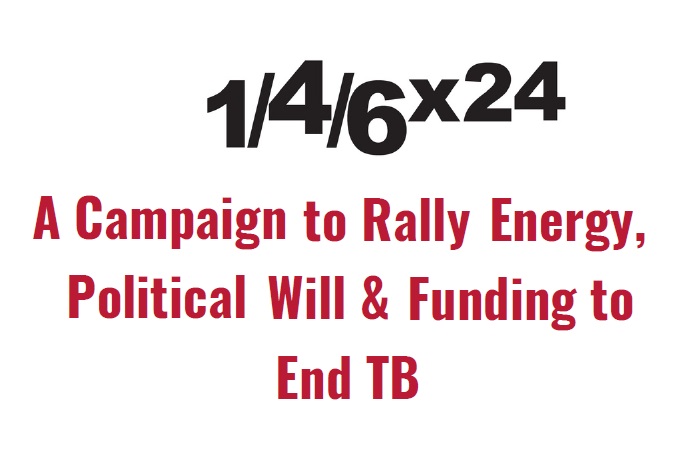
Several key global health actors have already set plans into motion to answer the 1/4/6x24 Campaign call to action, making major commitments. Two countries have also stepped up as global leaders.
On 28 October 2022, the 1/4/6x24 Campaign Coalition hosted a session at the USAID TB Symposium '1/4/6x24 Campaign Call to Action: Kick Starting Momentum Toward the United Nations High-Level Meeting.' The Campaign was co-founded by TB survivors, researchers, clinicians, civil society and allies of TB-affected communities, and calls on countries and other duty bearers to take urgent action to implement the shortest available regimens for the prevention and treatment of TB: one month (or once-weekly) for TB prevention, four-months for drug-sensitive TB and six-months for drug-resistant TB, by the end of 2024.
Several key global health actors have already set plans into motion to answer that call, making major commitments to the 1/4/6x24 Campaign. Two countries have also stepped up as global leaders. You can see these commitments presented in a full recording of the USAID TB Symposium session here, and read more about them below:
Dr. Bern Nyang’wa, Medical Director of Operational Centre Amsterdam and Chief Investigator of the TB-PRACTECAL trial, said Médecins Sans Frontières (MSF) will boost access to 1/4/6 regimens through efforts including active case finding and scale up of shorter TB preventive treatment regimens, the four-month regimen for children, and the six-month regimen for drug-resistant TB, and advocacy to take down pricing and other barriers to key medicines and diagnostic tools. See the full commitment here.
Dr. Patrick Ulysse, Chief Operating Officer of Partners in Health (PIH), said PIH will lead by example, implementing 1/4/6 regimens in their care delivery service areas and expanding social support, and advocate for additional relevant investments in the 5 S's, including by working with government and other partners to update guidelines and National Strategic Plans, and increase the priority of 1/4/6 in Global Fund concept notes. See the full commitment here.
Dr. Sahu Suvanand, Deputy Executive Director of Stop TB Partnership, said Stop TB commits to support 1/4/6x24 communications, and to fold campaign activities into its work with affected communities and discussions with funders and countries, and to create demand for new regimens by amping up advocacy for TB diagnostics and drug sensitivity testing to find people living with TB who aren’t yet being reached. See the full commitment here.
Dr. Tereza Kasaeva, Director of the Global TB Program of the World Health Organization (WHO), said WHO commits to work with member states to facilitate dialogues with Ministries of Health, donors, and other stakeholders to address barriers, support introduction, and monitor the implementation of the new TB treatment and prevention regimens. See the full commitment here.
Cheri Vincent, Chief of the TB Division at the United States Agency of International Development (USAID), said USAID commits to provide targeted technical assistance and support for the development of policy and implementation plans in 24 priority and Global Fund funding eligible countries, support local and community organizational advocacy, capacitate and train healthcare workers on the new regimens, and address other critical campaign needs, including related to procurement and monitoring and evaluation. See the full commitment here.
Dr. Eliud Wandwalo, Head of Tuberculosis Programs at the Global Fund, said the Global Fund pledges to work closely with countries to incorporate and fund the 1/4/6 regimens and other "program essentials" as part of NFM4, portfolio optimization, reprogramming, and other means, and to coordinate with other large funders to better leverage combined purchasing power to shape markets to improve access. See the full commitment here.
Dr. Brenda Waning, Chief of the Global Drug Facility (GDF) at the Stop TB Partnership, said the GDF will coordinate drug supply and create an enabling environment for manufacturers to encourage the development of fit for purpose formulations for 1/4/6 regimens, and support governments and other key stakeholders to expedite their introduction. See the full commitment here.
Dr. Jennifer Furin from the Sentinel Project on Pediatric Drug-Resistant TB, said the Sentinel Project will provide technical assistance to help programs and clinicians transition to using shorter prevention and treatment regimens for children affected by TB, and to advocate to close persistent dosing and safety data and pediatric formulation gaps. See the full commitment here.
Finally, two countries have already stepped up as 1/4/6x24 leaders: Georgia has updated its national guidelines to include 1/4/6 and procured necessary drugs and diagnostics, and South Africa is rolling out six-month regimens for drug-resistant TB – echoing its role as an early champion of bedaquiline and all-oral regimens.
Source: Treatment Action Group